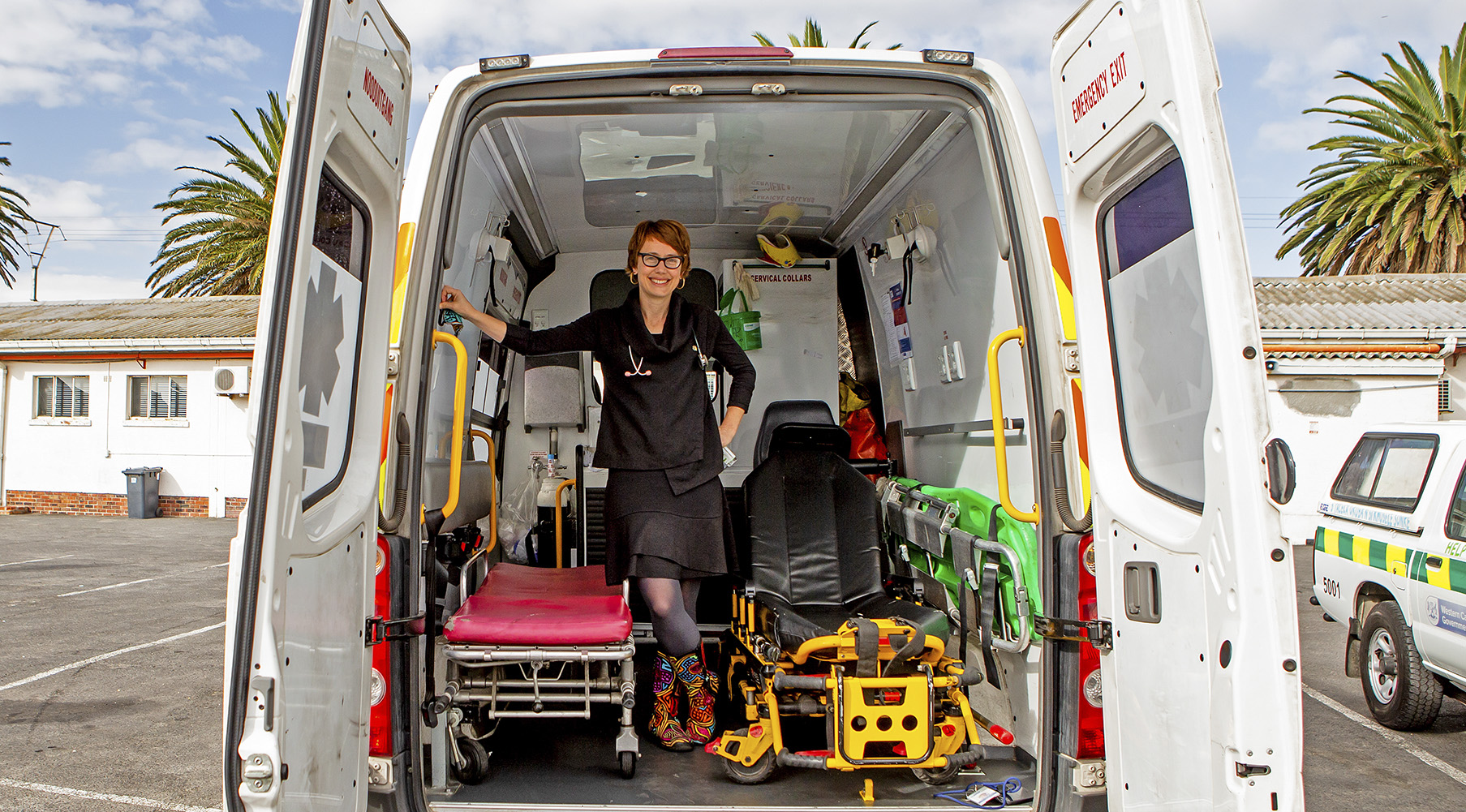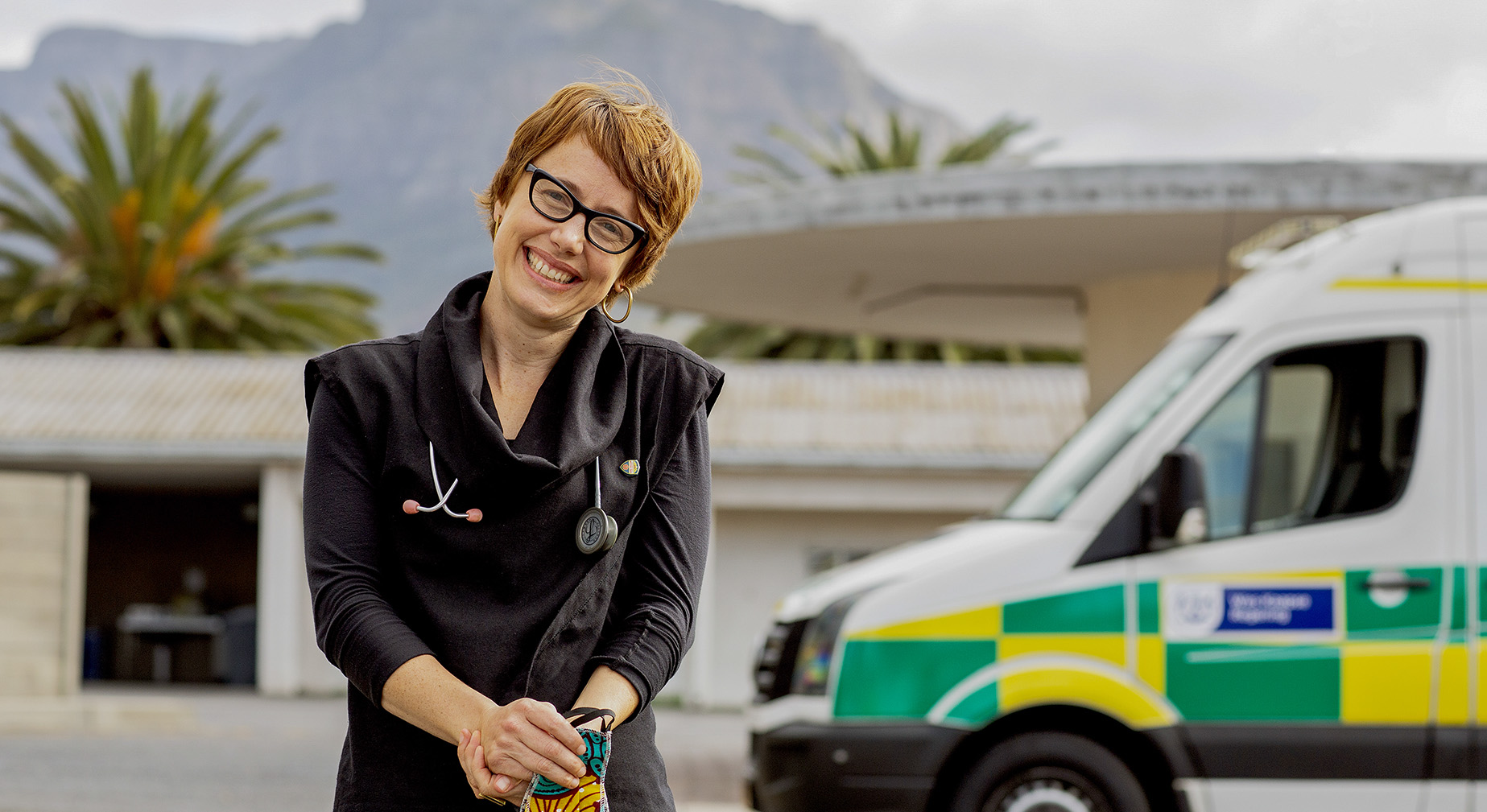Leanne Brady wears a staggering array of hats. A public sector doctor, health policy researcher and documentary filmmaker, she is also considered the main driving force behind Cape Town Together – which spawned Gauteng Together and Eastern Cape Together – essentially collectives of Community Action Networks (CANs) that propped up much of South Africa during the darkest hours of hard lockdown.
Speaking to Maverick Citizen over Zoom from her home in Salt River, Brady is quick to deflect such credit.
“So I pulled a team together,” she says. “The way we talk about it, we try to avoid terms like ‘pioneers’ or ‘founders’ because it was such a collective effort. It was small teams initially organised in all of our neighbourhoods, which then became these broader networks.
“Because of my position, located in the health department, and because of my previous experience in pandemics and my experience in activism work in Cape Town, I was really lucky to know so many great people. So for me, it feels important to frame it like that, you know?”
Cape Town Together’s Facebook page, which has 19,100 members, describes the initiative as “something beautiful, experimental, and growing”.
It adds: “We are a network of self-organising neighbourhood-based groups taking action, and responding in unique and diverse ways to Covid-19 and beyond. Examples include community kitchens, theatre, care packs for the homeless, mask-making, blanket and winter clothes drives, and so much more.”
It also conveys reassurance, should matters appear somewhat chaotic: “The kind of decentralised, horizontal structure of this network is unfamiliar to most people and can be confusing to those of us used to typical bureaucracies and corporate organising, so don’t worry if things seem strange and chaotic at first.”
It was Brady’s lessons learnt at Connaught Hospital in Freetown, Sierra Leone, where she worked as part of the country’s 2015 Ebola response, that informed her community-based reaction to Covid-19 in South Africa. Brady was a public doctor in Sierra Leone for six months, in which time there were 27,609 suspected cases of Ebola, and 11,261 deaths.
“My work in Sierra Leone was largely hospital- and clinic-based, with the kinds of community engagement we did mostly insufficient,” she says. “So in many ways, in my Covid response, I tried to learn from the mistakes of not engaging communities more broadly. And I think many health systems are still grappling with that... how to support community-led responses.”
Despite Ebola’s devastation, the “galvanising force” of crisis remains etched in Brady’s mind.
Recalling her time at Connaught Hospital, she says: “To be honest, I did not consider it traumatic. It was actually a really wonderful experience because I worked in an incredible team and with the Ministry of Health. I learned so much and actually I almost stayed.
“There is something about these acute crisis moments, it really brings people together; sort of in the same way Covid has done, now. And in that manner it becomes a very positive experience. In a crisis moment, there is this sense of collective purpose, a galvanising force.”
The hat Brady feels most comfortable wearing is that of “public health systems activist”.
Currently, she is a researcher at the Western Cape Department of Health’s Emergency Medical Services, while completing a doctorate in “collective action catalysed by the health system” at the University of Cape Town. One of her PhD case studies is paramedic safety in Red Zones. These are areas classified as having high levels of violence, with ambulance crews having to wait for police escorts before entering.
As a government employee, Brady wants to change the health system from within. “It’s quite easy to feel like the department is a monolith and that it’s failing us, but actually there are a lot of good people,” she says.
Apart from her medical qualifications (a Bachelor of Medicine and Bachelor of Surgery degree from the University of Pretoria, and a Master’s in Public Health from the London School of Hygiene and Tropical Medicine), and clinical experience ranging from treating Ebola patients to training in cataract surgery in Swaziland, Brady’s arsenal includes art: documentary filmmaking, photography and poetry, through which she reflects on the humanity of healthcare.
 Dr Leanne Brady wants to change the health system from within. (Photo: Liza van Deventer / Fairlady)
Dr Leanne Brady wants to change the health system from within. (Photo: Liza van Deventer / Fairlady)
She explains: “What became clear to me was that what we learnt at medical school was insufficient to deal with some of the complex social issues impacting health systems.
“A lot of what we are taught at medical school is obviously focused around clinical care, but actually so much of what makes people sick or makes people healthy has to do with more social and political determinants of health. And so some of the reasons for bringing in the creative work is to understand some of these complex issues, and to work with them to open up conversations, I guess.”
For example, her 11-minute documentary film Red Zone Paramedics follows an ambulance crew working the night shift on New Year’s Eve in Mitchells Plain. Made in 2018, it is used to promote safety for paramedics. Watch the film here.
“So this paramedic, he is saying goodbye to his wife, as if he might not come home,” says Brady. “It’s a real problem because obviously access to emergency care is constitutionally mandated. But delivering care to some of these areas is very, very difficult. And so some of the work we did was to recognise the complexity of working in those areas. The storytelling, it humanises the emergency personnel, showing the complexity of the violence.”
Three years ago about 200 people attended a screening of Red Zone Paramedics in Tafelsig, in Mitchells Plain.
“There was poetry, with karaoke and breyani,” says Brady. “The director of Emergency Medical Services, the ward counsellor, and a number of paramedics working and living in the area were there.
“And it allowed for conversations between mothers, who have waited far too long for ambulances to come and fetch their kids, and the paramedics, and so on. During one of these conversations a woman named Joanie Fredericks brought out a big white sheet, and said: ‘We need to pledge as a community to keep our paramedics safe because they can’t come and help us if we don’t keep them safe.’ And sort of very spontaneously, a large number of people came and signed this pledge.”
Going forward, Brady is excited that CANs will be useful, even in a post-Covid world.
“There are also some CANs in Limpopo now, and elsewhere. Anything can be a CAN, right? So any sort of group of people in a neighbourhood organising around an issue could call themselves a CAN. I mean, in Cape Town we’ve heard about some CANs which responded to fires, both now with the University of Cape Town and before in Gugulethu and Hout Bay.
“The relationships established as part of the CANs meant they were in a much better place to respond; relationships like these in times of crisis are really, really important.”
On Brady’s lap, a puppy is crying, begging for her attention. She credits her own community, her own neighbours in Salt River, for caring for her during lockdown, while she worked to care for vulnerable people around the Western Cape.
“We have a community garden across the road from my house, which is very nice,” she says. “There’s been a lot of support, especially during the pandemic. I mean, my neighbours were bringing me food almost every night. So I would come back from a long day at work and Faeeza would be knocking on the door saying: ‘Hey, I made you some dinner. Maybe it’s too late now, but, you know, keep it for tomorrow.’”
Back to Covid-19, Brady admits to preferring the collective action spurred by crisis, to the “slow violence of a health system that feels stuck” – “like you keep working every day to try and improve it. And it just doesn’t feel like anything’s getting better, and everybody feels exhausted and worn out. That’s a much more difficult environment to work in.”
However, her demeanour is one of optimism and persistence. “There’s a lot of good people, really trying to make this health system work, you know?” DM/MC




 Dr Leanne Brady is excited that Community Action Networks will be useful, even in a post-Covid world. (Photo: Liza van Deventer / Fairlady)
Dr Leanne Brady is excited that Community Action Networks will be useful, even in a post-Covid world. (Photo: Liza van Deventer / Fairlady)